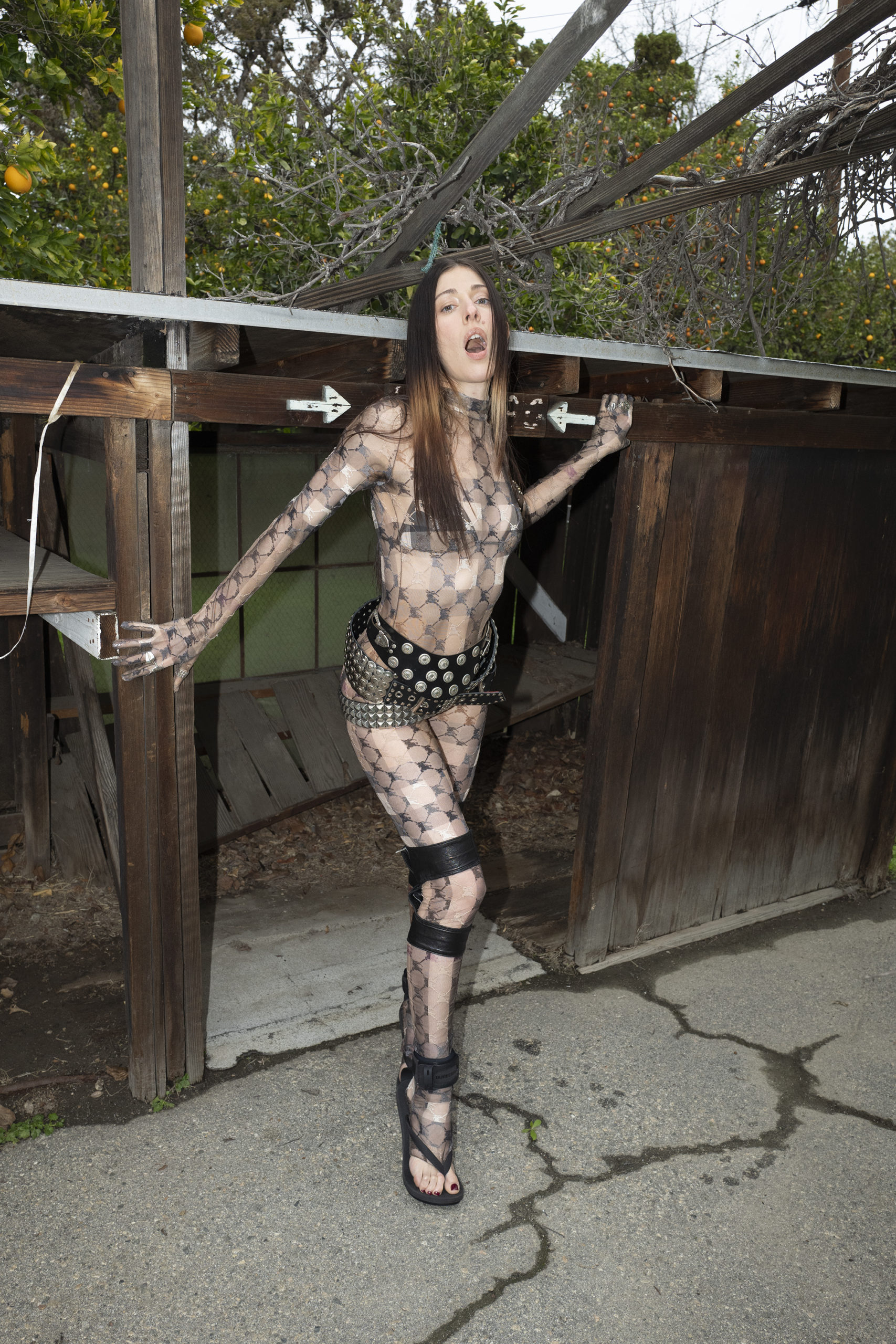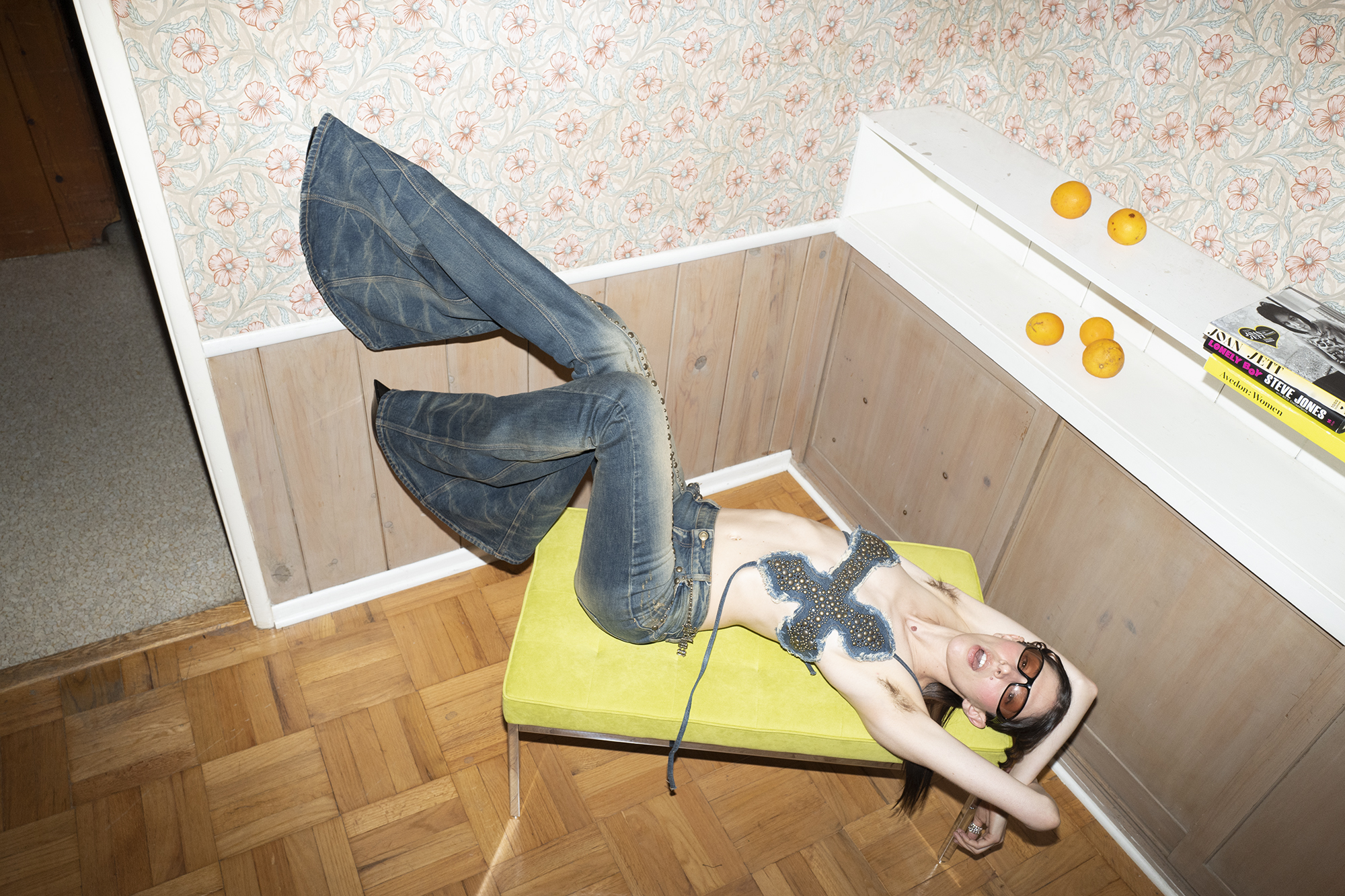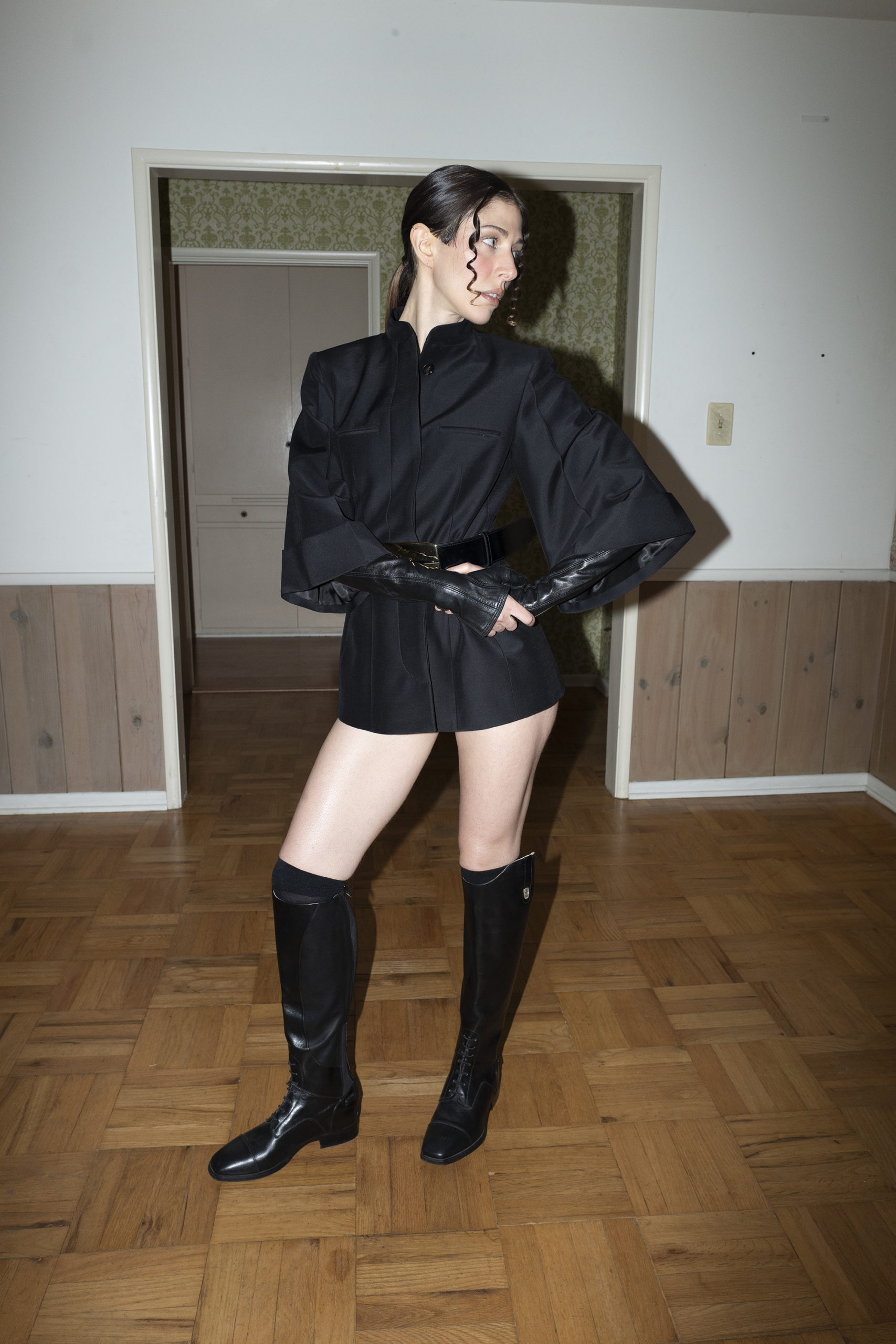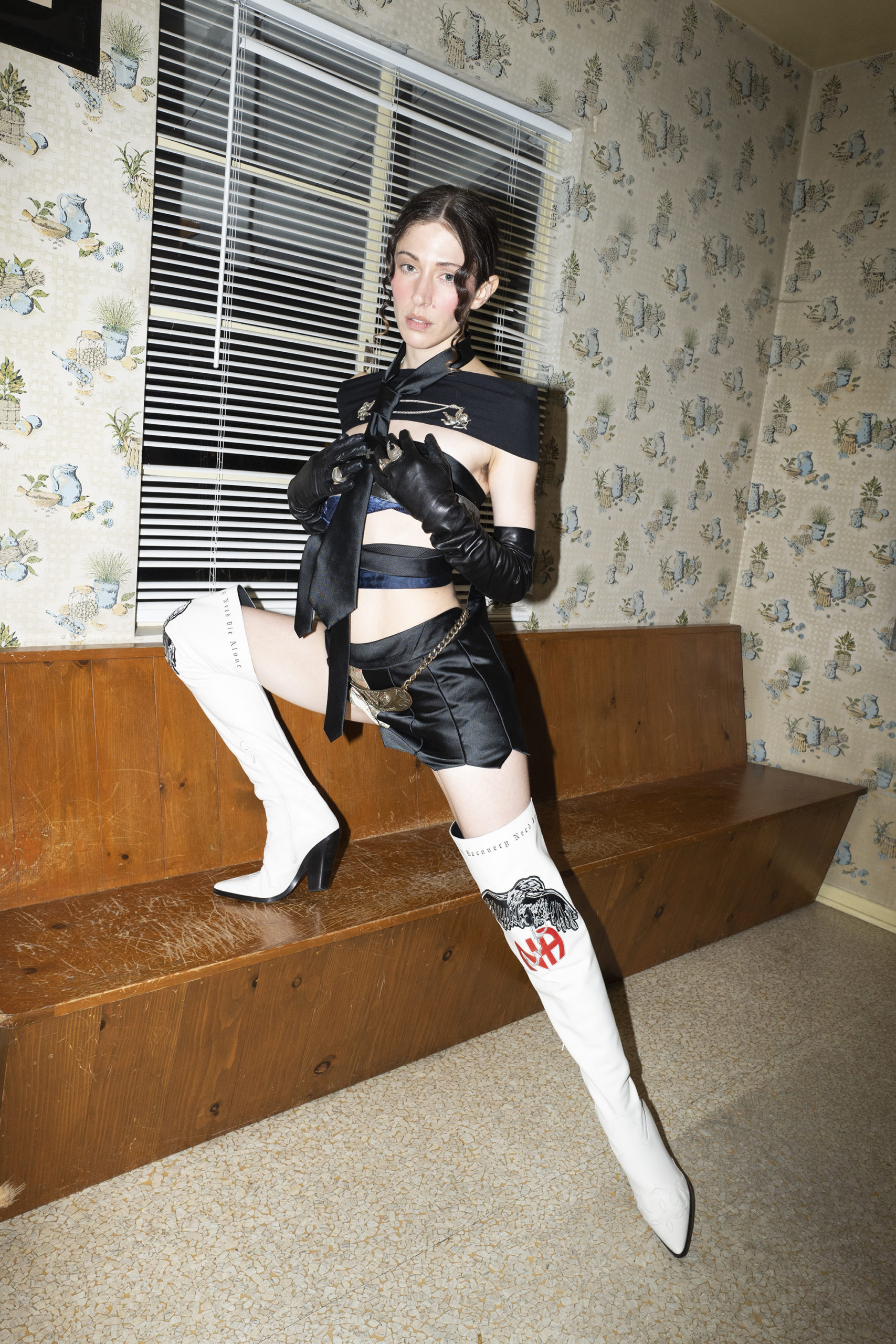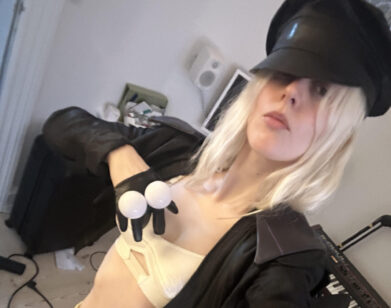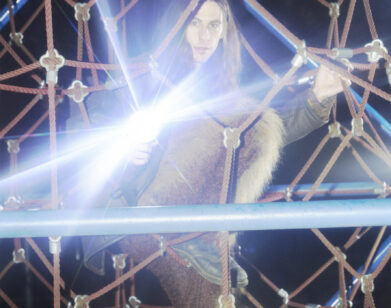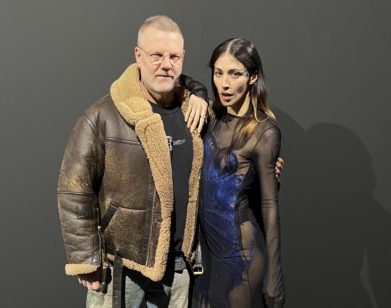VOICE
Caroline Polachek and OPN on AI, Code-Switching, and “Failure Pop”
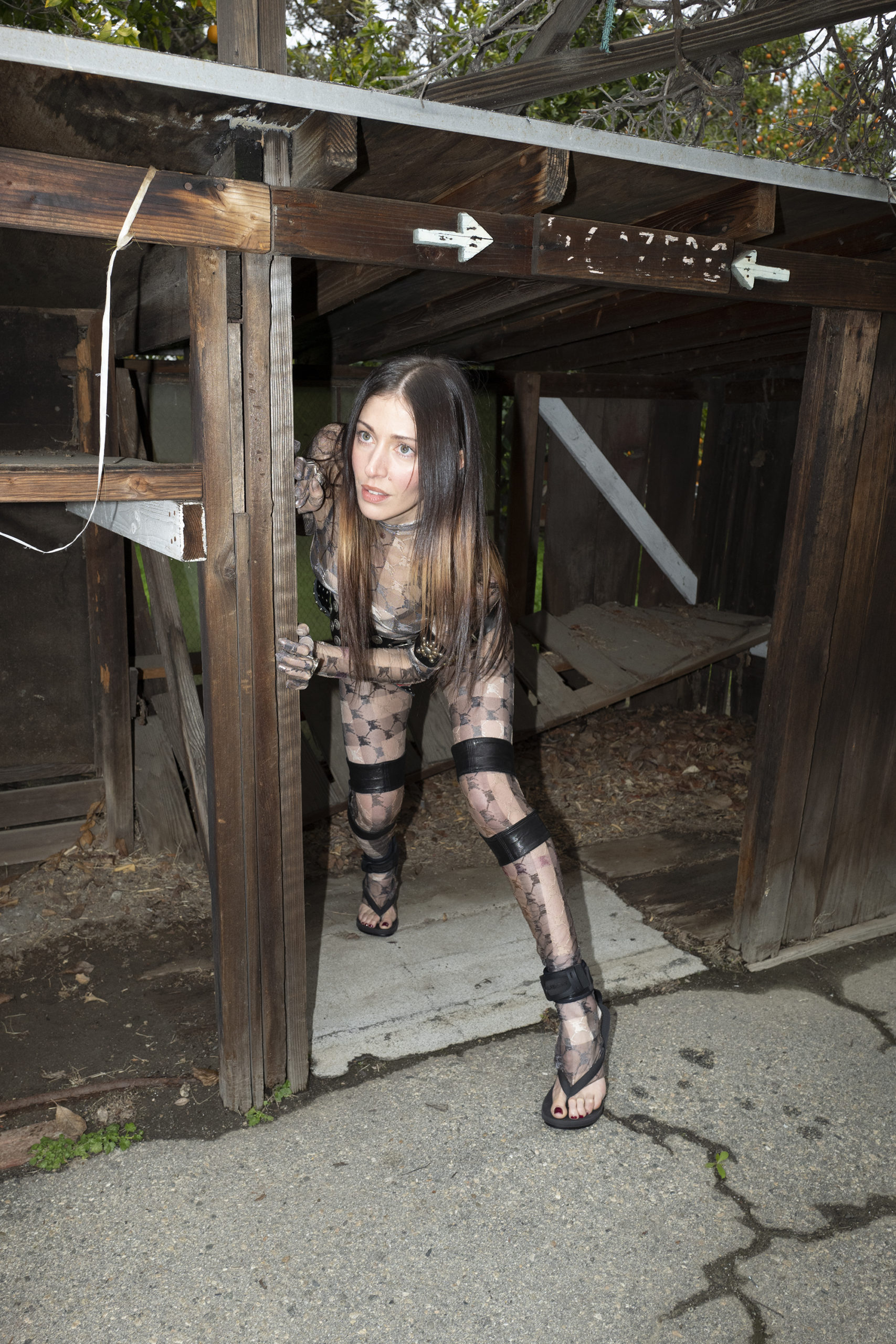
Catsuit, Bikini, and Shoes Burberry. Belts Stylist’s Own. Kneepads Soma Faitanin. Jewelry Amy Rodriguez.
Caroline Polachek is in the Valley putting the finishing touches on Desire, I Want to Turn Into You, the follow-up to her solo debut, 2019’s Pang. She’s in that self-described “chronically freaked out” phase, right before a new record comes out. But when her friend and collaborator, the electronic musician Oneohtrix Point Never (aka Daniel Lopatin) logs onto Zoom from Brooklyn, Caroline casts a big smile, and the two of them spend the next hour nerding out about the intricacies and inspirations behind her music.
———
CAROLINE POLACHEK: There you are.
ONEOHTRIX POINT NEVER: I recognize your surroundings.
POLACHEK: You’ve been here.
OPN: [Laughs] Let’s save the sentimentality for after we’re done working.
POLACHEK: I think it’s all good if we go into it.
OPN: Alright. Let’s start off with a softball. I’m not going to drag you through the mud like all these other journalists. I’m not going to compare you to Kate Bush or anything like that. We’re here to talk about Caroline Polachek. First of all, I saw that last night you posted pasta and meatballs on main. What clues are you trying to give us about your spicy new record?
POLACHEK: [Laughs] I was actually just vibing. It was a Sunday afternoon and I was just in a mood so I went out for pasta. I was actually filming a video because I wanted to rerecord all of the audio with really insane Foley so that when I took a bite out of a meatball, it’d be like a bomb exploding. And then Matt [Copson] was like, “This looks great. Just go live.”
OPN: That’s so sweet. You guys really ride for each other. And the slurpy sound of pasta is terrific, especially if you’re trying to do horror or something.
POLACHEK: Dan, I miss you!
OPN: I miss you too. I’m trying to be professional. I want to be cold and severe like you’re used to with journalists.
POLACHEK: I’m down. I mean, it’s Interview magazine, you can do whatever you want.
OPN: I’m just really happy for you. It’s a very intense time when new music is coming out. I can imagine that you’re very excited. I wanted to talk about, without embarrassing you, your stratospheric rise.
POLACHEK: Thanks, Dan. I mean, we’re the class of ’08. You know how it’s been. I’m always chronically freaked out right before the record comes out, because it’s the moment when you’re about to hand it off to the world. It goes from being your baby to their baby. But this time around, I’m making this album literally right up to the week it’s released. It’s going to be fresh out of the oven.
OPN: What’s your routine these days? You’re in the Valley, you’re working out of a studio nearby. Are you against the clock? Or you can move around a little bit?
POLACHEK: That’s the beauty of going straight to streaming.
OPN: Are you going to split the release and do physical at some point?
POLACHEK: Yeah, the physical’s coming. I’m a total sucker for packaging. But I’ve always been all over the map when it comes to a day-to-day schedule. Sometimes I go to the studio to do remote mixing sessions. You know my studio, you stayed here. But sometimes I’m just working on stuff at home. It’s a lot of sending files back and forth because most of the people I’m working with are in London. London’s my spirit home, in a way.
OPN: It just occurred to me that there was this change I perceived in you when you were on that epic stadium tour with Dua Lipa. We were talking a lot and would cross paths, and I saw that you really embraced it. I remember at first—you weren’t really nervous, but you had some conventional anxieties about going into this new thing. But then it almost seemed like not only did you embrace it, but it supercharged you. Your stage presence, your performativity, your confidence, all that stuff, it’s really athletic right now. And I wonder if that had any impact on the shape and the sound of the record?
POLACHEK: Yeah. The Dua tour was a pretty deep assignment because, within the world of releasing our own music, there’s always context around what we’re doing. And it was suddenly being thrust into this environment where the people who are watching the show have zero context. It really forced this awareness of, “What am I trying to convey? How do I do it in half an hour? And how do I make it sustainable?” I approached it with total sincerity. I was thinking about, “What is the archetype of my music? What am I trying to embody, and how can I do that in a way that her fans would understand?” One of the things that came up was this sense of physicality. There were just three of us on this massive stage playing for 20,000 people a night, and I had to train on tour. I was going to the gym on mornings off because the physical exertion of running around that stage while trying to sing in a really controlled way was a whole new assignment for me. I look back on how it felt performing at that time, when I was so finely tuned, and I think that’s a place that I’ll be trying to get back to for a while. It’s the coolest possible experience I could have had as a supporting artist because—you know how it goes, very often these things are pretty soul-sucking. But I found it to be the opposite because I felt so deeply challenged by it.
OPN: You’re doing a great job. You continue to knock my socks off with your talent.
POLACHEK: Well, you gave me a good talisman. As you know, I have this little tradition I do on tour where I hit up my closest friends and ask them to give me an image that will inspire me over the course of the tour and then I put the photos up inside my bunk.
OPN: Aw.
POLACHEK: But you sent me a photo of a side-by-side of Picasso’s first and last self-portrait, which just really steamrolled me. I wanted to ask you about your relationship with it.
OPN: It’s exactly what we’re talking about. Part of our bond is that we’ve seen each other through all kinds of transformations. And when you look at a storied artist’s career, you see that they’re still interested in trying to understand themselves at the end of their life as much as they were at the beginning—it’s just a simple reminder that tour is war, and that we do this because we’re called to it.
POLACHEK: That’s what I took from it—moving from exteriority to interiority over the course of your career, if you’re lucky enough to get one.
OPN: Totally. We’re talking about trying to become more whole, and those two pictures are so interesting because you can see the young artist’s concern is to show their virtuosity, and their athletic prowess, and maybe copy other artists. And then by the end, at least in those two images, you saw someone who saw themself fragmented and abstracted. It was just a note to both of us to say, “Keep chipping away at becoming who you really want to be, whatever shape that takes.”
POLACHEK: It’s interesting that you mentioned copying other artists as a young person, because that was definitely something I did. I look back on some of those first records that I made with Chairlift, they were essentially mixtapes where each song was a sort of genre pastiche, a super obsessive homage to different artists and styles that we loved.
OPN: I feel the exact same way. That first OPN tape was essentially me emulating Legowelt, aka Danny Wolfers—
POLACHEK: I was actually listening to that last night. I was hearing Tim Hecker in it, and also, it was really beautiful because that was the social context you were coming up in as well. There’s so much tribalism in music, and as a young artist, one of the most important things you have is your scene, and so willing it into existence with that kind of signaling is so important.
OPN: Totally. Okay, I want to boast about you a little bit. It’s not news to you that I think your vocal melodies are very special. They’re like nothing that exists right now, and nothing that has existed. It’s almost beyond music to me. It’s the closest thing I can approximate to IDM—it’s like Aphex Twin with vocal melodies. Listening to some of the new stuff, it seems like you’re expanding your bag of tricks. You have that virtuosic thing that you do, but what I really like about the new record is that there are these really playful ad-libs and embellishments and this interlocking syncopation. There’s more power in it. There’s more humor in it. There’s all this stuff that’s really bursting. So, what’s going on over there, CP?
POLACHEK: First of all, thank you. All of that is such a huge honor, coming from you. On one hand, I think my ear just needed to be refreshed from constant melody and especially very tuned, precise melody. I wanted to hear notes bending around and thrown against the wall a bit more. I wanted to hear slippage into speech and back out of speech. I wanted to hear vocals go around the corner and then sing to you from the bathroom and then come back to the mic, and I wanted to have a more expressive approach and less of a composerly approach.
OPN: Totally.
POLACHEK: I still can’t help myself with songs like “Sunset,” which are so trad, in terms of their composition and what they’re trying to do. Those songs still feel like perfectly interlocking Lego blocks to me, in terms of how they’re put together vocally. And in songs like “Pretty in Possible” and “Crude Drawing,” I’m thinking about things in a more scenic way and in a way where I’m seeking to refresh my own ear at multiple points within the song, in a way that feels like scratching an itch.
OPN: As a sidebar, “Pretty in Possible” is my favorite song of the bunch that I’ve heard.
POLACHEK: You heard that song really early in the process. I don’t know if you remember, but I played it for you in the car while we were waiting to go hiking at this state park. [Laughs]
OPN: Your music has a hallucinatory effect on me but I do remember listening to that. I needed some healing and your music is a weird balm on me because it’s recorded very well. It’s very precise, which I always enjoy because I like smooth, contoured-sounding records. Not that there’s not this unbelievable edge to the record. Another tangent, I don’t know if you’ve heard of this software called Pink Trombone?
POLACHEK: The vocal model? It’s amazing. I think about Pink Trombone all the time—that impression of singing that it’s left, because sometimes I see photos of myself onstage, and I look like a pelican. My neck is so expanded, and it’s shocking looking. I’m like, “What is going on down there?” And I realize what I’m doing is actually creating extra space.
OPN: Your larynx is expanding.
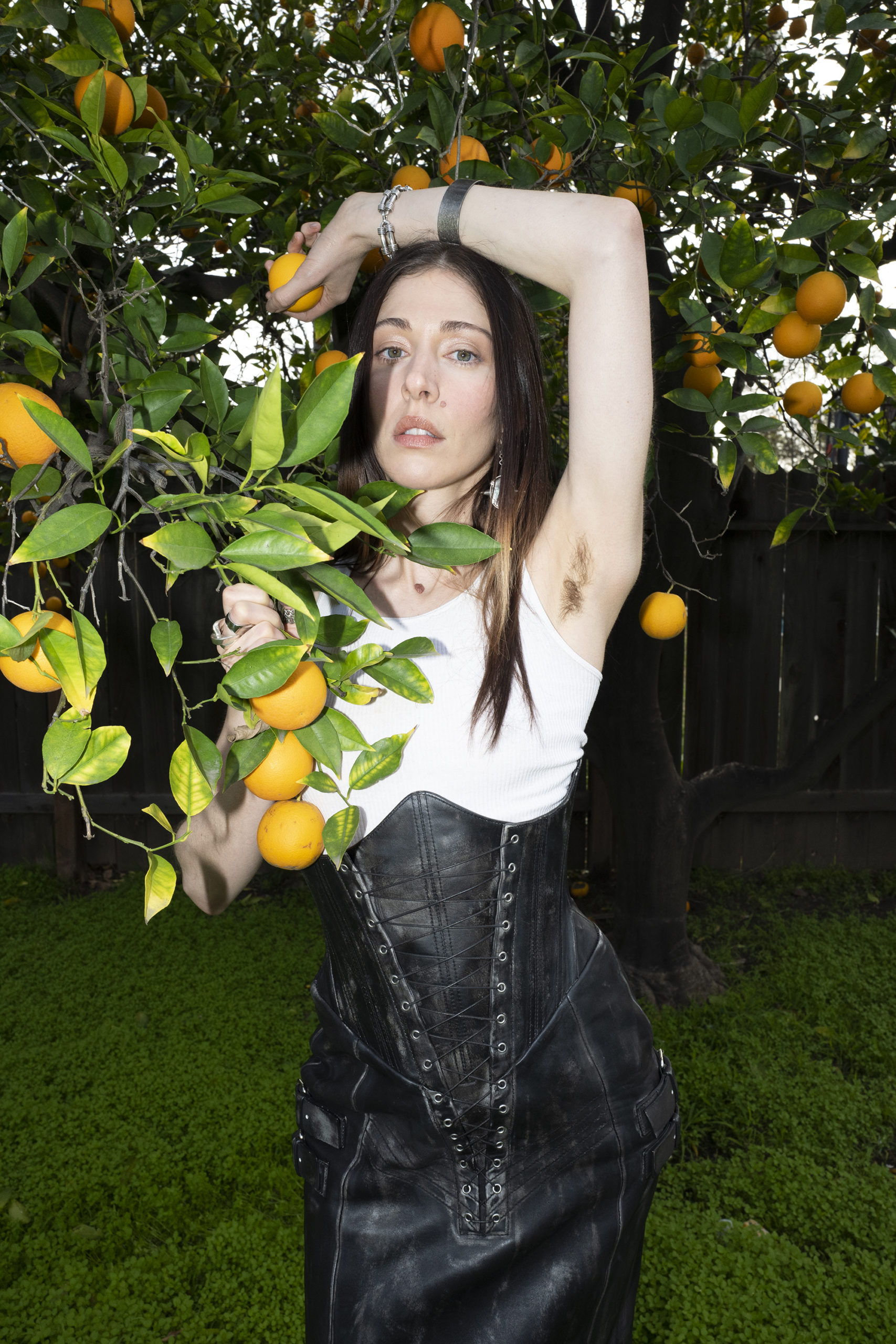
Dress Dilara Findikoglu. Top and Bracelet Stylist’s Own. Earrings (vintage) Jean Paul Gaultier. Rings Amy Rodriguez.
POLACHEK: Yeah. I’m not a big person, so I’m creating this extra space for vocalizing.
OPN: This is the athleticism that is very impressive.
POLACHEK: But in the moment, it’s just a feeling. That’s the wild thing about singing. You can study it, but ultimately, what you’re going to work through with a voice teacher is navigating different feelings and sensations. Different resonances definitely hit at different places in your body. And it’s so deeply psychedelic. Sometimes I laugh when I read about people having “good voices.” I’m like, “What are you talking about? Singing is mental.” It’s about how much you’re willing to practice.
OPN: But you do have stylistic directives. Song by song, I can hear that you’re willing certain kinds of affect out of your voice. I feel like there are different characters.
POLACHEK: Some of the most genius vocalists of our time, like Young Thug and Nicki Minaj, they’ve done it with such an extraordinarily postmodern visceral effect. Which isn’t to say that I’m imitating their approach, but that they’ve unlocked something within culture that’s made it not only very acceptable, but actually a more honest form of vocalizing because that’s what it’s like to be a person. You have different versions of yourself, and you’re echoing different attitudes constantly.
OPN: It’s a mood, and if you’re a good songwriter these days, you’re going to have an expansive vocabulary and knowledge about those kinds of moods. That is how music works.
POLACHEK: It’s how online expression works as well. You’re code-switching between different attitudes and tones, between hyper-sincerity and irony and LiveJournal-style vulnerability. And that, I think, is a more honest way of interacting with the culture now. I don’t even think about it in music because it’s something I’ve done since day one. Again, going back to those early Chairlift songs, I was just trying different affects and attitudes on for size.
OPN: Different masks, yeah.
POLACHEK: Not even different masks, because we have endless pluralities inside of ourselves. I think if you start thinking about which voice is your own, you’ll go mad.
OPN: Do you have XM radio in your car?
POLACHEK: I don’t. I’m a Bluetooth girl.
OPN: Okay. Well, I’m an XM radio–head and—
POLACHEK: What’s your station?
OPN: Lithium is my number one go-to, but it depends on my mood. But ’90s on 9, ’70s on 7—
POLACHEK: Lithium goes hard. I once drove across the whole U.S. listening to Lithium.
OPN: Totally, but I would be remiss to not ask you about the ’90s on 9 vibe of this record because I feel like there’s a secret code. I could go song by song and we could talk about all kinds of amazing pastiche you’re doing, but there is a really strong, beautiful exploration and manipulation of music that we both love quite a bit. I was just wondering what you think about that.
POLACHEK: I guess I’m wrestling with my relationship with the idea of nostalgia because I normally reject it. But in the case of some of this record, it’s very relevant. I started looking back on this certain archetype of really comforting diva music that existed in the ’90s, like Celine Dion and Sarah McLachlan.
OPN: Suzanne Vega.
POLACHEK: Exactly. I mean, it fucking goes. It’s not like, “We’re chilling out in the coffee shop.” It’s like, “This music has subs.” I started thinking about who the modern torchbearers of that kind of archetype were, and I was struggling to come up with anything. I realized that I had an opportunity to carry on, not that sound, but that tone, that feeling of this very comforting yet vital propulsion. Because so much of that music honestly walks a very, very thin line between going over the edge into being completely cringe and saccharin and—
OPN: CVS-core?
POLACHEK: Yeah. So it was a very tantric assignment to be like, “Alright, how close to the edge—”
OPN: That’s such a good way of putting it.
POLACHEK: There’s nothing that I’m doing for the sake of pastiche. It’s got a lot of heart in it.
OPN: I don’t see pastiche as an enemy of the heart. You can go through pastiche to the heart.
POLACHEK: One of the amazing lessons that we’ve all learned from Lana [Del Rey] is how hyper-economical you can be when you deploy pastiche, because you can very efficiently, in a few words or a few sounds, trigger a whole array of feelings that other artists—over the course of decades—have painstakingly created. It’s an efficiency of communication.
OPN: Which is really apparent on this record. It’s really succinct. It never enters into the world of irony. A lot of instrumental music that’s in the vein of the things that I’m interested in—when I feel like it’s close but no cigar, it’s because it weirdly gets obsessed with some kind of detail that doesn’t really matter. And the detail that matters, for me as a listener, is that you’re emotionally hooking me with this impossible-to-deny thing that I just want to hear over and over again.
POLACHEK: I actually want to ask you what your cultural predictions are for AI music, and also if you have any personal interest in working with it.
OPN: I do. You know what was funny? I was recording John Medeski from Medeski Martin & Wood. He’s an incredible improviser, he can do anything with a key that you can imagine. It was intimidating and it was very, very hard to impress him. Then after a while, I stopped caring and I was just like, “You want to hear some weird shit?” And I played him the AI Jukebox in the style of Elton John or Kanye or whatever, and he stopped dead in his tracks. He looked pale and he goes, “It doesn’t sound good, but the arrangements—why can’t music just sound like this?” What he was hearing was not the AI doing great things on purpose. The current moment we’re in is juicy and interesting because it’s not working very well.
POLACHEK: There’s a lot of potential to capture the feeling of lostness better than a human could possibly do it.
OPN: Before capitalism does its natural refinement process.
POLACHEK: Your music deals with so much of the hyper-articulation of feelings of lostness.
OPN: [Laughs] Absolutely. Thank you.
POLACHEK: Maybe one of the most human feelings possible.
OPN: It was funny because I was like, yeah, I could use AI somehow, but ultimately it needs to be in service of creating a picture of the world as I see it. That’s what those OPN records always are. But when I started out, it was glitch music. You were hearing people saying things like failure pop.
POLACHEK: Failure pop is amazing. I’m gagged.
OPN: Some of my best homies were failure pop and still are to this day. [Laughs] Also, I don’t know if you ever feel like this. I’ve been having this new version of demo-itis where I literally just want it to sound like a fucking demo. I don’t think I’m unique in that. I think it’s this collective unconscious post-pandemic return to modesty, which is kind of pathetic, but it’s honest in the way that we feel like we’ve got to bring it down a notch. And I don’t feel like you are doing that at all, so kudos to you for not succumbing to this collective pressure to be falsely modest.
POLACHEK: I did go hyper-maximalist on this record, obviously. But I think in the same way that you were speaking about, trying to imitate how the world feels, I wanted to capture this dilated-pupil feeling of being overwhelmed. It’s the sound of being alive and existing in this world that’s too big and too bright. But it’s really interesting to think about modesty because I’m having a lot of fun being a brat on this campaign. On one hand it comes with the fact that this is—I actually can’t even remember if this is my seventh or eighth record—but also it’s a massive taboo as well. Of course, at the core, I’m porous and very emotional and these songs dip into moments of total vulnerability and self-hatred, but that’s not at odds with being a brat and being a diva and being extremely confident. The two of them are not mutually exclusive at all, so I’m enjoying the contradictions in this record.
OPN: It’s just totally you. It’s an elegant self-portrait. I know your body language. You’re euphoric when you’re looking at a fucking menu. You have a real appreciation and gratitude for your life and that’s so apparent in the energy of your music. From that position you can go anywhere. You can go into excesses because at the core of it is your excitement. That’s a gift you give because you’re showing us how to seize the moment. Whether it’s your eighth, ninth, 20th record, this is just who you are and so it’s really exciting to be getting a new record from you.
POLACHEK: We’re coasting into the future together, Dan.
———
Hair: Fitch Lunar using Joico at Opus Beauty
Makeup: Leo Chaparro using Make Up For Ever
Manicure: Ashlie Johnson
Production Coordinator: Mara Weinstein
Prop Coordinator: Daniel Moses Flores
Photography Assistant: David Elterman
Fashion Assistant: Natalie Smithson
Production Assistant: Raea Palmieri

